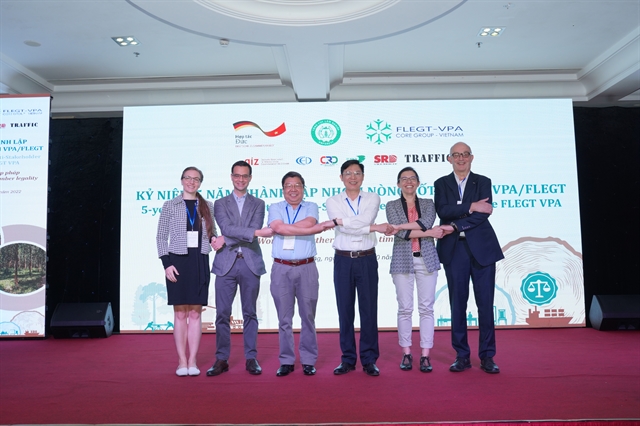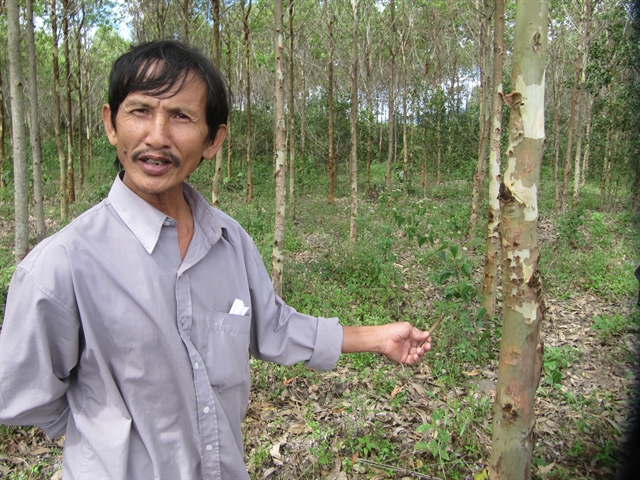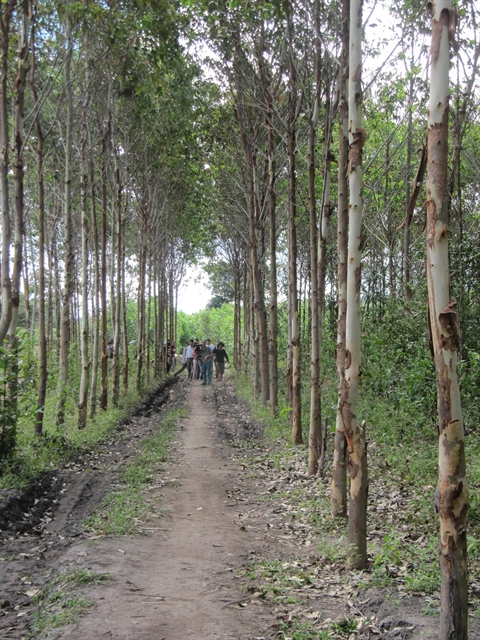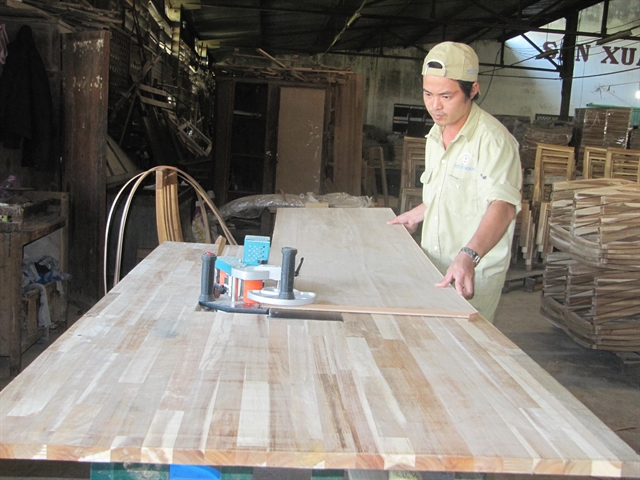 Environment
Environment


|
| Participants join a photo session at the workshop on the five-year implementation of the Multi-Stakeholder Core Group under the Voluntary Partnership Agreement on Forest Law Enforcement, Governance and Trade (FLEGT VPA) in Bình Dương Province. — Photo courtesy of GIZ/Ben Media |
BÌNH DƯƠNG — Many efforts have been made by Việt Nam and the Europe Union to improve forest governance and enhance the legal framework for timber and timber products exported to the EU.
These efforts were reviewed at a workshop on the five-year implementation of the Multi-Stakeholder Core Group which was established under the umbrella of the Voluntary Partnership Agreement on Forest Law Enforcement, Governance and Trade (FLEGT VPA).

|
| A local farmer introduces his log farm in the Central Highlands Gia Lai Province in the implementation of the Voluntary Partnership Agreement on Forest Law Enforcement, Governance and Trade (FLEGT VPA). — VNS Photo Công Thành |
The workshop, which was a collaboration organised by the Administration of Forestry (VNFOREST) and the German Development Cooperation Organization (GIZ), unveiled that many actions have been implemented since Việt Nam and the EU signed the FLEGT VPA in 2018.
The active engagement of a variety of stakeholders is at the core of the FLEGT VPA and serves as the basis for its effective and successful implementation.
The FLEGT VPA Multi-Stakeholder Core Group (Core Group), which was established in 2017, provides a platform for coordination and participation in the FLEGT VPA implementation.
"The Core Group should focus on strengthening the organisation and defining issues, content, and topics for FLEGT VPA’s implementation,” said Phạm Văn Điển, deputy director general of VNFOREST.
“The group should be carrying out consultations and performing the task of providing information related to FLEGT VPA’s implementation in Việt Nam as well,” he said.
The Core Group has helped develop a policy brief focusing on the situation of Việt Nam’s Enterprise Classification System (ECS) – a key step towards establishing a strong Vietnamese Timber Legal Assurance System (VNTLAS).
It is hoped that this will contribute to increases in business values, expansions of market share and explorations of new markets, while simultaneously – once Việt Nam’s FLEGT licences are issued – reductions in the overall future workload of verification and inspection by competent authorities.
”The policy brief that has been developed and published by members of the Core Group has shown the gaps and potential risks in the implementation of regulations on labour contracting, labourers’ insurance, and labour safety by small and micro timber enterprises in the context of the FLEGT VPA implementation,” said Cao Chí Công, the Core Group Co-Chairperson.
“Since the negotiation and now the implementation, the focus of the collaboration and support has shifted to ensure the alignment of the legal framework from Việt Nam with the agreements in the FLEGT VPA as well as capacity development and surely support the active involvement of the various stakeholders in the process," said Anja Barth, Chief Technical Advisor, GIZ Việt Nam.
"The Core Group is a key aspect of the implementation and success of this process and I think also the contribution and the active engagement has been recognised and appreciated several times by the two parties.”

|
| A log farm is developed to ease the exploitation of logs in forests. — VNS Photo Công Thành |
To date, the Core Group has involved more than 40 members representing six different groups of organisations, including the private sector, timber industry associations, non-governmental organisations, research institutes, international development partners, supporting forestry-related projects and verification agencies.
The export turnover of timber and timber products of Việt Nam has increased from US$3.4 billion in 2010 to $14.5 billion in 2021, making the country the second largest timber exporter in Asia and the fifth largest in the world.
The EU is Việt Nam's fifth largest export market of timber and timber products. In 2019, Việt Nam's export turnover of timber products to the EU reached over $1.03 billion, accounting for 9.2 per cent of the export market.
The country currently is home to nearly 14,000 enterprises of different scales that are active in processing and producing timber products. These enterprises together create more than 500,000 long-term jobs for workers, contributing to sustainable economic development.

|
| A worker processes timber at a factory in Quảng Nam Province. The factory has developed its owned log farms to provide material for furniture for export to the EU market. — VNS Photo Công Thành |
Việt Nam is facing global challenges related to illegal timber harvesting and trade. Therefore, drastic and comprehensive solutions are needed to ensure the sustainable and legal growth of Việt Nam's timber industry, while promoting good forest governance.
After six years of negotiations, FLEGT VPA came into force in 2019, and Decree 102 promulgated by the Government of Việt Nam in 2020 described the key aspects of Việt Nam's legal system for the timber industry.
When the FLEGT licensing system comes into operation, Việt Nam will only export timber products with FLEGT licences to the EU market. Additionally, the EU will only permit Vietnamese timber to enter into the EU if it has a valid FLEGT or CITES licence. — VNS



.jpg)
